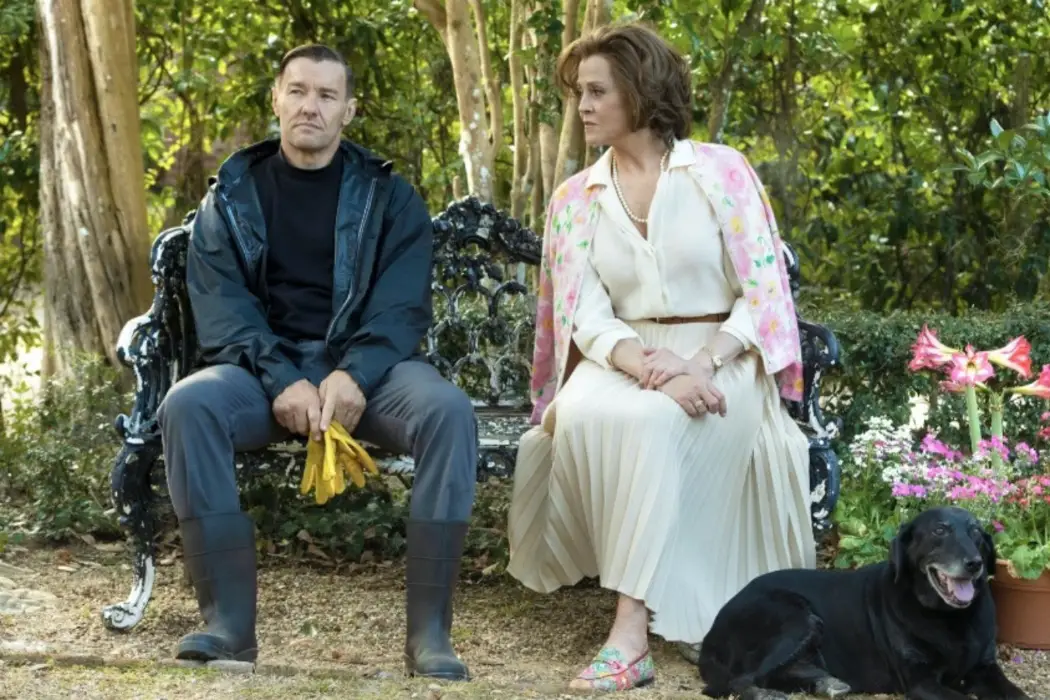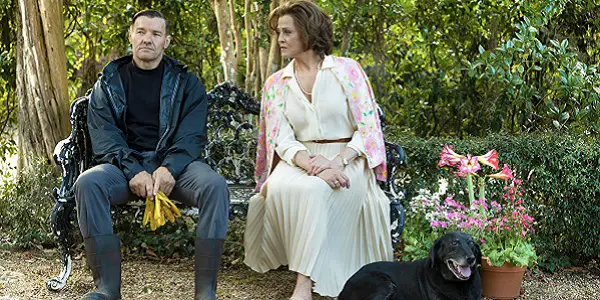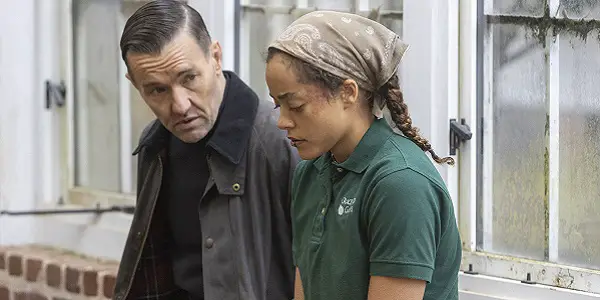New York Film Festival 2022: MASTER GARDENER

Lee Jutton has directed short films starring a killer toaster,…
In Paul Schrader’s First Reformed, a former military chaplain (Ethan Hawke) is burdened with a dark event from his past — the death of his son in the Iraq War — but finds a new lease on life through radical environmentalism and a relationship with a woman (Amanda Seyfried). In Schrader’s following film, The Card Counter, a former soldier (Oscar Isaac) is burdened with a dark event from his past — his role in the torture and abuse of prisoners at Abu Ghraib—but finds a new lease on life through professional gambling and a relationship with a woman (Tiffany Haddish). In Schrader’s latest film, Master Gardener, a former white supremacist (Joel Edgerton) is burdened with a dark event from his past — uh, being a white supremacist — but finds a new lease on life through gardening and a relationship with a woman (Quintessa Swindell, who in real life identifies as nonbinary).
Now, one cannot fault a filmmaker for sticking to what they do well, especially when, like Schrader, they generally do it really, really well. First Reformed is, in my opinion, one of the most devastating films of the past decade, a painful meditation on loneliness and purpose that forces one to reconsider the meaning of one’s life. Alas, with Master Gardener, Schrader ends this loose trilogy of films focused on moral responsibility, not with a bang, or even a whimper, but more of a “huh?”
In Bloom
Edgerton stars as Narvel Roth, the man in charge of maintaining the meticulous grounds of Gracewood Gardens, a sprawling Southern plantation. He is good at his job, and passionate about it, returning home to his cabin on the estate every night to scribble notes about the art of horticulture. However, Narvel harbors a dark secret: he used to be a white supremacist who committed murders on behalf of a racist gang before selling them out and joining the witness protection program. Evidence of his past is inked all over his body, with tattoos of neo-Nazi symbols and phrases hidden under turtlenecks and long sleeves.

The only person around Gracewood Gardens who knows what Narvel used to be is the wealthy woman who owns the estate, Mrs. Haverhill (an imperious Sigourney Weaver); she uses this knowledge to get Narvel to do whatever she wants, including sleeping with her. One day, Mrs. Haverhill informs Narvel that he must take on her troubled grand-niece, Maya (Swindell), as an apprentice and prepare her to one day inherit the estate. Maya is intelligent and beautiful but tangled up with an abusive drug dealer and her own addiction. Soon, Narvel falls for her, and finds himself forced to confront his past once again through their burgeoning relationship — something made extra fraught by the fact that Maya is biracial.
Heading Two
Schrader is an expert at spare, minimalist storytelling, but a little too much is left unsaid in Master Gardener, making these characters and their actions a little too hard to believe in. What is said is often laughter-inducing, despite the heavy topics at hand. The script is rife with cringeworthy dialogue, much of which is given to Weaver, who nonetheless does a magnificent job embodying the “respectable” face of white supremacy — the side that accessorizes with passive-aggressive propriety and piles of money instead of white hoods and rifles. And as Narvel, the criminally underrated Edgerton has never been better. His stoic performance highlights how much routine and restraint have become crucial to Narvel’s new life, where the slightest instigation can trigger a fury of dormant violence that belies his placid exterior. Swindell is also excellent; they ensure that Maya is a real and interesting character in her own right, not just a vehicle for Narvel’s journey.

Unfortunately, the film’s romance flatlines despite Edgerton and Swindell’s best efforts to bring it to life; their relationship feels much more like that of father and daughter than that of people who are sexually attracted to each other, rendering some scenes downright icky despite the obvious hotness of the people involved. The scene in which Maya confronts Narvel about his past, and everything that immediately follows, feels almost fantastical in the way it is depicted by Schrader; it is just incredibly difficult to imagine a young woman of color forgiving an older white man for such horrifying crimes so easily. Even if you believe that Narvel deserves a chance of redemption if he has truly repented of his past, I don’t think Maya would (or should) be the one to give it to him. The more their romance progresses, the more Master Gardener feels detached from reality, epitomized by an absurdly silly scene in which Narvel and Maya drive through a blooming field of CGI flowers at night and whoop gleefully.
Apart from that particular moment, Master Gardener is a beautiful-looking film. Yes, the film’s focus on gardening and flowers as a visual metaphor for growth and rebirth is all too obvious, but it works regardless and looks fantastic on screen courtesy of cinematographer Alexander Dynan (who also shot First Reformed and The Card Counter). Indeed, the entire Gracewood Gardens estate is incredible — especially the jellyfish-emblazoned blue wallpaper that covers the sitting room where Mrs. Haverhill frequently receives Narvel with a c*cktail dangling from her well-manicured hand. All this visual splendor masks the ugly history of the racism inherent in such a grand plantation; in contrast, the run-down motel rooms where Narvel and Maya find themselves later in the film are incapable of keeping secrets, painfully honest in their spare furnishings and bare walls.
Conclusion
Paul Schrader is a master storyteller, but even masters are capable of misfires.
What do you think? What is your favorite Paul Schrader movie? Share your thoughts in the comments below.
Master Gardener is currently screening as part of the Main Slate at the 2022 New York Film Festival.
Watch Master Gardener
Does content like this matter to you?
Become a Member and support film journalism. Unlock access to all of Film Inquiry`s great articles. Join a community of like-minded readers who are passionate about cinema - get access to our private members Network, give back to independent filmmakers, and more.
Lee Jutton has directed short films starring a killer toaster, a killer Christmas tree, and a not-killer leopard. Her writing has appeared in publications such as Film School Rejects, Bitch: A Feminist Response to Pop Culture, Bitch Flicks, TV Fanatic, and Just Press Play. When not watching, making, or writing about films, she can usually be found on Twitter obsessing over soccer, BTS, and her cat.













